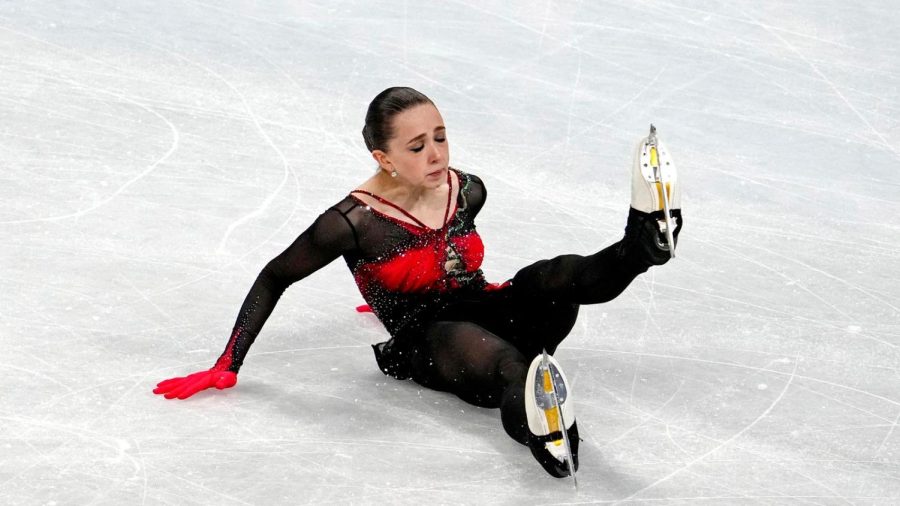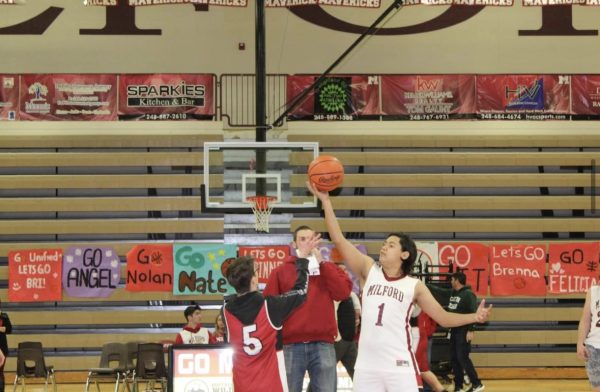Russia creates controversy in the Olympics again
March 25, 2022
skating events were controversial at best. From illegal drug use to questions on who would earn a medal, there is much to criticize about the Russian Olympic Committee (ROC).
Banned from the Olympics in Dec. 2019, Russia was originally set to be excluded for four years for widespread state-sponsored drug use by the World Anti-Doping Industry.
Reduced to a two-year ban by the Court of Arbitration for Sport, they have been allowed to compete under the neutral ROC title, but are not allowed to compete under the official Russian country nor its flag or symbols.
If there was any label of Russia, there had to be ‘neutral athlete’ or some similar phrase in the same size print as the Russian label.
Another consequence of the ban included the removal of Russia’s national anthem. Instead of their anthem being played, they are required to play something without direct relation for the country, which has ended up being Tchaikovsky’s Piano Concerto No. 1 for the ROC competitors.
In this year’s Olympics in Beijing, issues with Russia flared up yet again as skater Kamila Valieva, the first female skater to land a quadruple jump in the Olympics, tested positive for illegal, performance enhancing drugs. What is even more concerning is the fact that she is 15 and minors are subject to lesser punishments than their adult counterparts.
Valieva was tested and cleared of drugs in Beijing before she competed, however, it was later revealed that Valieva had tested positive for Trimetazidine on Dec. 25 before the games. Valieva claimed at the hearing that it was not her intention to take the drug.
She said the Trimetazidine, a drug that can enhance endurance by helping blood flow to the heart faster and getting oxygen to the body quicker, was mixed up with her grandfather’s medication.
There were only trace amounts of the drug found in Valieva’s system. Valieva defended that it was only found because the two had shared a water glass and it was not a purposeful drug use.
Although she was clean in Beijing, Valieva still faced possible consequences and attended a hearing to decide whether she could compete in the Olympics. It was later decided she would be able to skate, but much of the situation was still unclear and being investigated.
Trimetazidine was not the only drug found in Valieva’s test. The World Anti-Doping Agency stated they found two other substances in her test.
These substances- L-carnitine and Hypoxen- are both legal but the Anti-Doping Agency argued that because of these, Valieva’s argument of accidental ingestion is invalid.
Perhaps this investigation undermined Valieva’s confidence. She was predicted to get gold and was almost guaranteed a spot on the podium based on her skill in previous shows.
However, during her performance she was shaky during her opening quad salchow, stepped out on a triple axel, spun out late on a jump, and things did not improve throughout her show.
Valieva fell multiple times in her performance on a quad toe loop-triple toe loop combination and again on another quad toe loop, altogether losing her combination.
After her disastrous showing, Valieva did not keep the lead she had set in her short program. She placed fourth and did not receive an individual medal. Despite Valieva’s disastrous finish, the Russians still managed to place in the female skating event.
Russia claimed both first and second on the podium while Japan took third.
First place was taken by Anna Stanislavovna Shcherbakova for the second time in a row at the Winter Olympics. Second was awarded to Alexandra Trusova with a routine full of technicality and difficulty. Japan’s Kaori Sakamoto rounded out the podium with a third place finish.
Sakamoto did not have the difficulty Trusova’s routine had and with that factor in mind, she was thrilled with her Olympic result.
“I don’t have the big jumps as others would have, which is a big handicap,” said Sakamoto according to Detroit News, who made up for the lack of high air by creating art on the ice that will be remembered for years to come. “That means I had to have perfect elements” which she truly did as she danced across her frozen stage.
Trusova was not as excited with the Olympic decisions. With all the complicated moves required in her performance, the 17-year-old planned on winning gold.
When the placements were given and she learned she got silver she shouted: “I hate this sport! I won’t go onto the ice again!” and raised her middle finger, though it was unclear who she was addressing.
She declared it unfair and furthermore showed she is not at all happy with gaining an Olympic silver medal. Though her skate was complex, she had shaky landings and did not perform it with the beauty that the judges found in Shcherbakova’s performance.
Russia’s gold medalist was over the moon with her victory, “I still haven’t realized that my Olympic Games have ended. I just know that I skated clean,” Shcherbakova proudly stated, “I am so happy that I still haven’t realized the result.”
The 17-year-old may not have had the most technically difficult routine, but rather showed constant, clean skates that were claimed to have ‘peerless artistry and unmatched skill’ by USA Today, shown until her last free skate.
She started out with a flawless quad flip-triple toe loop combination and continued with an incredible last performance of her 2022 Olympic career.
Although there is much joy to be had for these skaters, it is hard to forget about the scandal concerning Valiena. Due to Valieva competing and placing on the podium in the team skate program, the IOC has decided to delay that medal ceremony.
If Valieva has a negative result in her case, the Russians that competed may not get medals. Consequently, the IOC will not give out medals until the case has been concluded, so that if it does occur, they will not have to take medals back from the other Russian performers.
Unfortunately, this means the medals earned by other countries will not be acquired either. Nine United States skaters and eight Japanese will not obtain the medals they earned.
Instead they will receive Olympic torches at the public ceremony and according to the IOC, they will, “organize dignified medal ceremonies once the case of Ms. Valieva has been concluded.”









